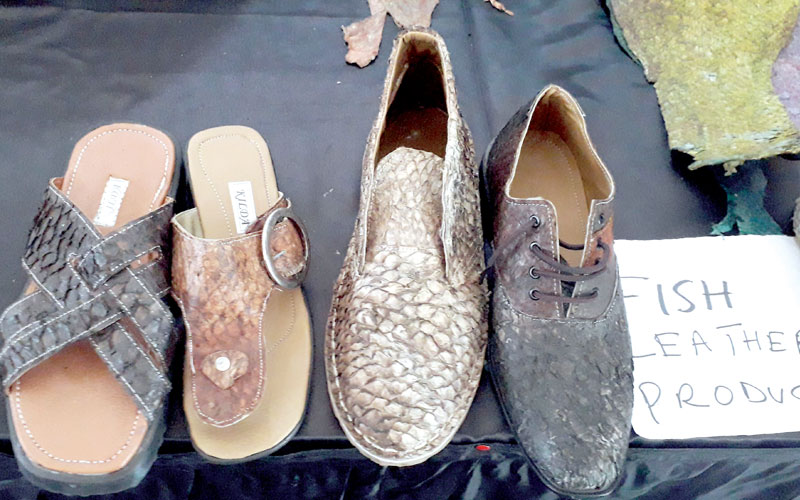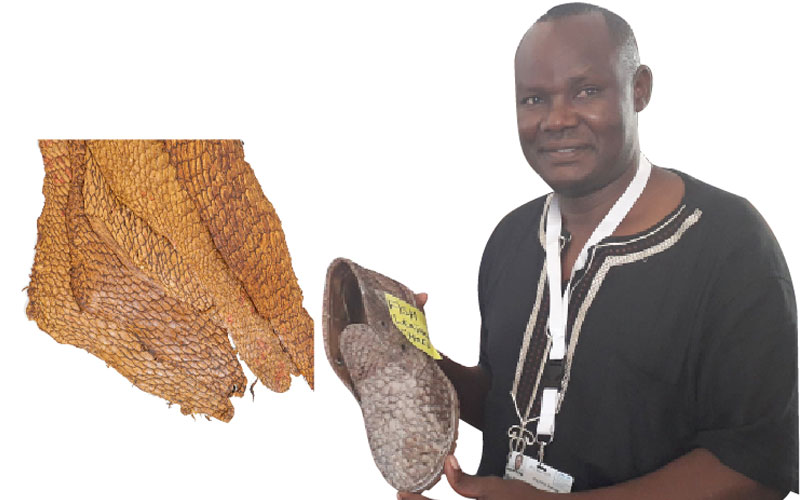Man rakes in millions from fish leather
By Milliam Murigi, September 19, 2019When you find Newton Owino sorting Nile perch skin, you will confuse him with a mad man, but this is where he gets his bread and butter.
Owino is a leather producer, but unlike many, he makes his leather from fish skin, a value-added fisheries by-product that would otherwise be discarded as waste only to pollute the environment as it decomposes.
He is the founder of Alisam Product Development, a limited company based in Kisumu.
Leather from Nile perch is used to manufacture shoes, belts, jackets, hats, wallets, purses, sandals and drums.
To many, this sounds like a dirty job but this business is lucrative. He established it with a capital of Sh200,000 immediately after graduating from GB Pant University of Agriculture and technology in India, where he gained specialised knowledge in leather chemistry.
Pilot project
“After graduation, I wanted to become a job creator rather than a job seeker; that is why when the idea of turning fish skin into leather was born in 2002, I couldn’t rest until I got what I wanted,” he says.
The idea was born after the National Environment Management Authority (Nema) ordered all companies in the fillet-processing business to dry their waste before burning it.
This was not a solution to Owino. It was a new and worse problem to the environment, as the waste was becoming a menace to the extent of attracting wild animals to the area.

His business started as a pilot project of turning fish skin into leather. Since he had to bring on board different partners, the research took him more than a decade, from 2004 to 2012, before he could come up with the final products. By then, 20 tonnes of fish skin waste were coming from the five fillet-processing plants in Kisumu.
Upon the success of the pilot project, Owino started training his workers on pre-tanning, tanning and post-tanning of the skin with organic tanning agent rather than chemical, which is a norm in the leather industry. Tanning is the art of making leather from rawhides.
Green tanning plan
“Having known the impact of the chemicals used during tanning, I decided to use plant extract. This tanning technique also helps in removing the scales which are also sold to make a range of other products,” he says.
The tanning process takes 12 hours and they use locally made tannery machines, which do all the processes including removing the scales.
The skin is soaked for an hour and either banana, pawpaw or acacia plant extract is added to get rid of the smell and strengthen the fibre. They then add salt to cut out bacterial infections on the skin before resoaking it for eight hours and drying it for the experts to start working on it.
“We involve professionals in making the products. All products are made in accordance with the international export standards. I have managed to access new leather markets in several countries in Europe and North America,” Owino says.
The biggest challenge his company faces is bulk production. Because of increasing demand, they face a shortage of raw materials, especially during the dry season.
Increase income
Their production capacity also is still low and sometimes they cannot meet the demand of both fish leather and fish leather products.
His long-term plans include coming up with a leather college for green tanning only and the biggest fish leather centre in Africa. And since he has partnered with European tanneries, he wants to increase his production capacity of fish leather from 4.6 tonnes to 21 tonnes per month to match demand.
His work hasn’t gone unnoticed: he is currently the chair of the Kisumu Leather Dealers Association, established with support from Switch Africa Green.
The association helps its members produce high-quality leather, gain better bargaining power, increase their income and secure access to financing such as loans to further develop the leather industry in Kisumu.
He is also conducting research on how best he can start using chicken skin to make leather products. Given his resilience and steadfastness, this does not sound like it is far-fetched at all. The sky is the limit for Owino.
